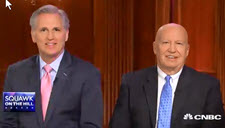House and Senate GOP leaders signaled this week they intend to pursue legislation that would make permanent the individual tax provisions enacted as part of the Tax Cuts and Jobs Act (P.L. 115-97) enacted last December (Roundtable Weekly, Dec. 22, 2017)
 |
House Majority Leader Kevin McCarthy (R-CA), left, and House Ways and Means Committee Chairman Kevin Brady (R-TX) discussed the impact of recent tax reform; a possible phase 2 effort; the recent resignation of House Speaker Ryan; and the endorsement of McCarthy as his successor on CNBC’sSquawk on the Hill . |
Under current law, many of the individual provisions – including the lower effective tax rate on pass-through business income – will sunset after 2025. Although the nonpartisan Congressional Budget Office (CBO) projected last week that the tax bill would add 1.9 trillion dollars to the national debt over a decade, making permanent the cuts that lapse after 2025 could add an additional 1.5 trillion over the next decade, according to a Tax Foundation analysis. (Roundtable Weekly, April 13 and Reuters, April 17)
House Speaker Paul Ryan (R-WI) on Tuesday said, "We fully intend to make these things permanent, and that’s something we'll be acting on this year." (Reuters, April 17). Senate Majority Leader Mitch McConnell (R-KY) added, "If they are interested in making the individual rates permanent that’s something we ought to take a look at. I don’t know why we wouldn’t want to do that" (Politico, April 17)
In addition to making the individual provisions permanent, House Ways and Means Committee Chairman Kevin Brady (R-TX) has also floated making immediate business expensing permanent, among other changes. (Bloomberg, March 28 and Miller & Chevalier, DC TaxFlash, April 17)
Although prospects for passing what President Trump calls a "phase-two" tax cut bill in the House are possible, a Senate bill would require 60 votes for passage, which Democrats could prevent in the closely divided chamber. (CNBC, April 5)
Brady and House Majority Leader Kevin McCarthy (R-CA) on Tuesday discussed the impact of recent tax reform; a possible phase 2 effort; the recent resignation of House Speaker Ryan; and the endorsement of McCarthy as his successor on CNBC’s Squawk on the Hill .
After recently announcing his retirement from Congress when the current legislative session ends in early 2019, Ryan declared his support for McCarthy as the next GOP House Speaker. (Deloitte, April 13 and ABC News, April 13)
The next GOP House Speaker candidate must get 218 votes in a floor vote, which gives the 30-member conservative House Freedom Caucus leverage to propose one of their members for a leadership position. Such negotiations will be irrelevant if Republicans lose the House in the 2018 midterm elections. (USA Today, April 18)